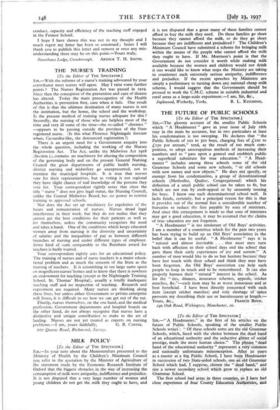THE NURSE'S TRAINING
[To the Editor of THE SPECTATOR.] SIR,—With the reforms of a nurse's training advocated by your contributor most nurses will agree. May I raise some further points ? The Nurses Registration Act was passed in 1919. Since then the conception of the prevention and cure of disease has altered. Today the main preoccupation of the Health Authorities is prevention first, cure when it fails. One result of this is that the ultimate destination of many nurses is not the institution, but the home, the school and the workshop. Is the present method of training nurses adequate for this ? Secondly, the nursing of those who are helpless most of the time and very ill some of the time—the so-called " chronics " —appears to be passing outside the province of the State registered nurse. (Is this what Florence Nightingale foresaw when, Cassandra-like, she denounced registration ?) There is an urgent need for a Government enquiry into the whole question, including the working of the Nurses Registration Act The Act, unlike the Midwives Act 1918 .Section t), contains no machinery for altering the composition of the governing body and on the present General Nursing Council the great departments of public health nursing, district nursing and midwifery go unrepresented, not to mention the municipal hospitals. It is true that nurses vote for their representatives, but as voting is not regional they have slight chance of real knowledge of the persons they vote for. Your correspondent rightly notes that since the -title " nurse " does not give legal status, the Nursing Council, unlike the Central Midwives Board; has no power to restrict training to approved schools: - Nor does the Act set up machinery for regulation of the hours and remuneration of nurses. Nurses dread legal interference in their work, but they do not realise that they cannot get the best conditions for their patients as well as for themselves, unless the community recognises the need and takes a hand. One of the conditions which keeps educated women away from nursing is the diversity and uncertainty of salaries and the inequalities of pay as between different branches of nursing and under different types of employer. Some kind of . scale. comparable to the Burnham award for teachers is badly wanted.
Your correspondent' rightly asks for an educational policy. The training of nurses and of nurse teachers is a major educa- tional problem and as much the concern of the State as the training of teachers. It is astonishing to see large sums spent on magnificent nurses' homes and to know that there is nowhere an endowment for teaching (except at the Nightingale Training School, St:. Thomas' Hospital), usually a totally inadequate teaching staff and no inspection of teaching. •Research and experiment are required. - Many nurses are thinking along these lines, but unless either Government or private enterprise will listen, it is difficult to see how we can get out of the rut.
Finally, nurses themselves, on the one hand, and the medical profession, Government departments and hospital boards on the other hand, do not always recognise that nurses have a distinctive and unique contribution to make to the art of healing. Nurses are not yet treated as experts on nursing problems.—I am, yours faithfully, G. B. CARTER. 66n Queens Road, Richmond, Surrey.






























































 Previous page
Previous page